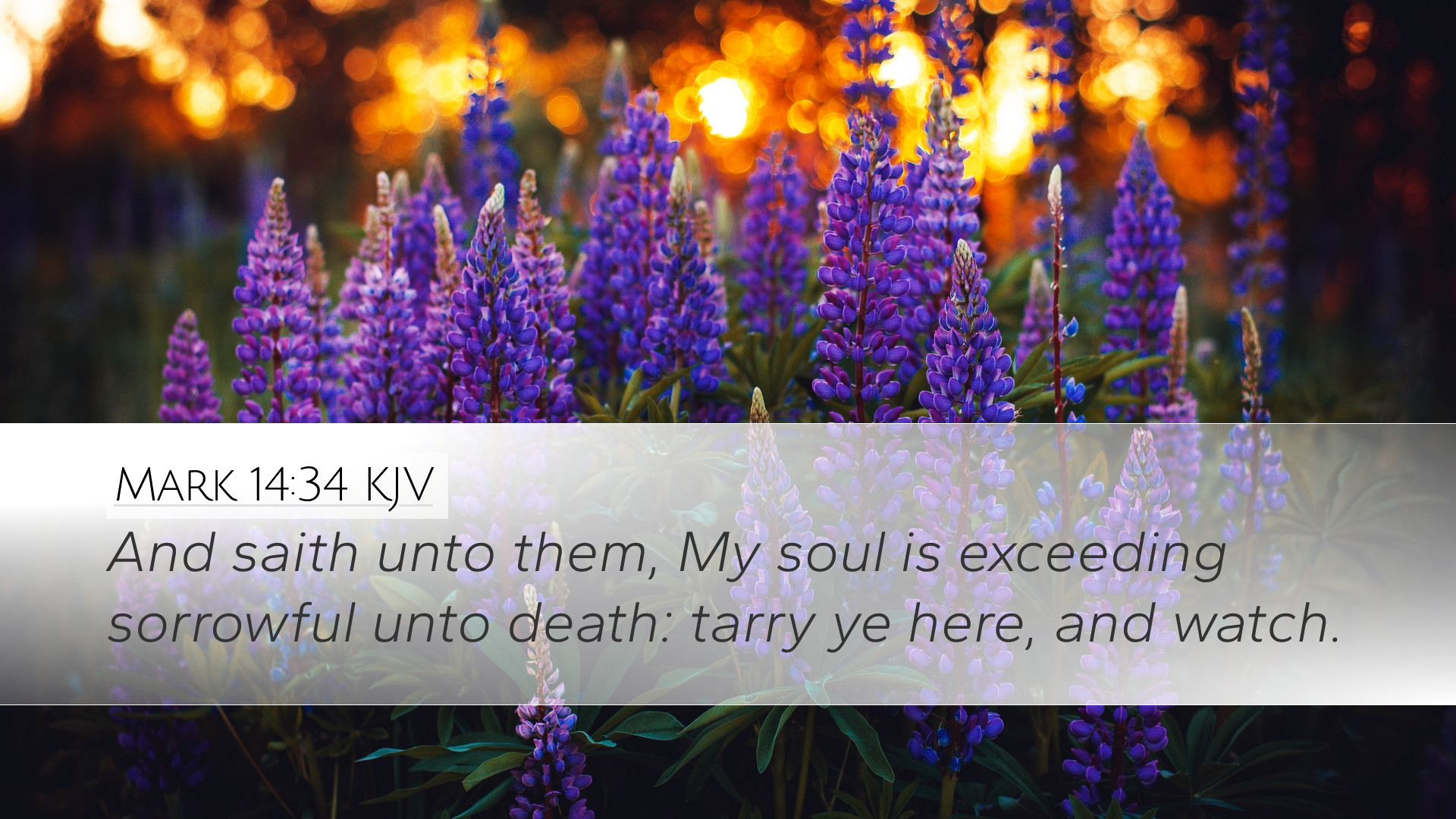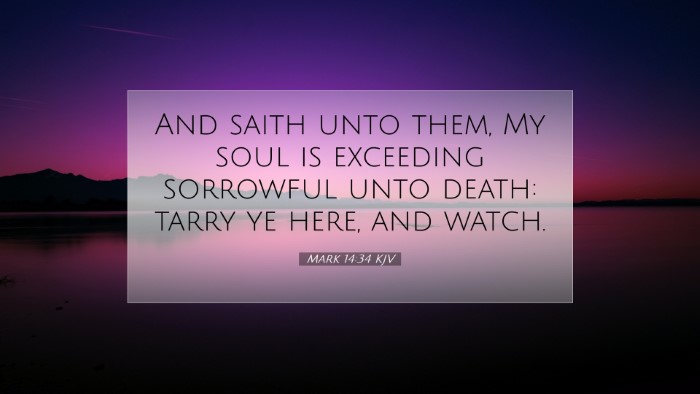Commentary on Mark 14:34
Verse Text: "And he said unto them, My soul is exceeding sorrowful unto death: tarry ye here, and watch." (Mark 14:34, KJV)
Introduction
The verse from the Gospel of Mark captures a poignant moment in the narrative of Jesus’ passion. In Mark 14:34, Jesus expresses profound sorrow as He approaches His impending crucifixion. This commentary synthesizes insights from notable public domain scholars, such as Matthew Henry, Albert Barnes, and Adam Clarke, to elucidate the theological and emotional depths of this passage.
Contextual Analysis
Before delving into the verse, it is essential to understand its context. This moment occurs in the Garden of Gethsemane, where Jesus retreats to pray shortly before His arrest. Here, He grapples with the weight of the sins He will bear and the agony of separation from the Father.
Emotional Significance
Matthew Henry’s Insight: Henry highlights the depth of Christ's emotions, noting that His sorrow is not merely superficial but deeply significant. He emphasizes that the phrase "exceeding sorrowful" indicates a sorrow that penetrates the very soul of Jesus, revealing His full humanity. This moment showcases the delicate balance between Jesus’s divine nature and His human experience, underscoring the reality of His suffering for humanity’s sake.
Albert Barnes’ Reflection: Barnes suggests that this sorrow was a reaction to the future suffering He would endure. It is a foretaste of the greater anguish that His atonement will entail—both physical and spiritual torment. Barnes underscores that this sorrow is for our sake, to bear our iniquities, which magnifies the depth of His love and commitment to humanity.
Adam Clarke's Perspective: Clarke elaborates on the emotional turmoil experienced by Jesus. He remarks that Jesus’ lamentation was a necessary prelude to the fulfillment of His mission. Clarke posits that this moment of sorrow was essential for our understanding of how Jesus, though divine, was fully aware of human anguish and suffering, thereby inviting us into an empathetic relationship with our Savior.
The Call to Watchfulness
Upon expressing His grief, Jesus instructs His disciples to "tarry ye here, and watch." This call carries significant weight in the narrative.
- Spiritual Vigilance: Henry notes that Jesus’ admonition to watch signifies the need for spiritual vigilance. In the face of temptation and impending trial, believers are called to remain alert, spiritually engaged, and responsive to God’s leading.
- Understanding Human Weakness: Clarke points out that this directive also reveals the human frailty of the disciples. Despite His request for their companionship and watchfulness, they would soon succumb to sleep, reflecting the common human struggle against lethargy in spiritual matters.
- Collective Responsibility: Barnes remarks that this moment showcases the communal aspect of faith. Jesus desired the support of His closest friends during His suffering, emphasizing that bearing burdens is never a solitary endeavor.
Theological Implications
Mark 14:34 is pregnant with theological meaning, providing insight into themes of suffering, kinship, and divine purpose.
- The Nature of Suffering: Theologically, this verse affirms that suffering is an intrinsic part of the Christian experience. Jesus does not shy away from His sorrow; instead, He embraces it, setting an example for believers facing trials and tribulations.
- Jesus as Mediator: This moment illustrates Jesus as the compassionate mediator between God and humanity. His explicit expression of sorrow serves as a reminder that He understands our emotional burdens, which enhances our relationship with Him.
- The Necessity of Prayer: In the narrative, prayer is integral to confronting sorrow. Jesus models a prayerful response to overwhelming grief, encouraging believers to turn to God in moments of distress.
Application for Believers
This verse invites both personal reflection and communal application for today’s Christian community.
- Embracing Emotion: Believers are encouraged to acknowledge their emotions, including sorrow and grief. Jesus shows that it is acceptable to express and wrestle with one's sorrows, and this acknowledgement can lead to deeper faith.
- Engagement in Watchfulness: The exhortation to "watch" is a call to be spiritually alert, fostering a life of prayer, accountability, and attentiveness to God's leading.
- Strengthening Relationships: This passage underscores the importance of supporting one another in times of distress. Just as Jesus sought the disciples' support, believers today are called to bear one another's burdens.
Conclusion
Mark 14:34 is a profound reflection of Jesus’ humanity, encapsulating sorrow, the need for vigilance, and the underlying framework of God’s redemptive plan. As students of Scripture, theologians, and pastors engage with this text, they are reminded of the emotional and spiritual realities that Jesus faced, offering a richer understanding of His sacrifice and the nature of divine love. This verse challenges all believers to remain alert, to understand the weight of their sorrow, and to approach Christ in every season of life—especially in moments of sorrow and anguish.


